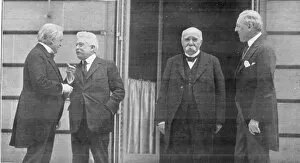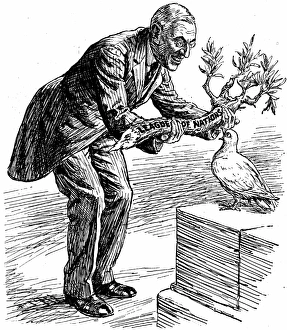Woodrow Wilson Collection (page 5)
Woodrow Wilson, a prominent figure in American history, was born on December 28, 1856, in Staunton, Virginia
All Professionally Made to Order for Quick Shipping
Woodrow Wilson, a prominent figure in American history, was born on December 28, 1856, in Staunton, Virginia. As the 28th President of the United States from 1913 to 1921, he left an indelible mark on the nation's political landscape. Wilson's childhood home in Staunton offers a glimpse into his early years and upbringing. The Woodrow Wilson homestead stands as a testament to his humble beginnings and serves as a reminder of the values that shaped him. Known for his progressive policies and visionary leadership, Wilson played a pivotal role during World War I. In April 1917, he addressed Congress with fervor and conviction, urging them to declare war on Germany. This decision would ultimately shape America's involvement in one of history's most significant conflicts. One iconic image captures Wilson blowing bubbles while contemplating the establishment of the League of Nations in 1919. This snapshot symbolizes his commitment to international cooperation and peacekeeping efforts following World War I. Throughout his presidency, Wilson faced numerous challenges but remained steadfast in pursuing social reforms such as women's suffrage and labor rights. His dedication to progressivism earned him admiration among many Americans who saw him as an advocate for change. In March 1917, thousands lined Pennsylvania Avenue during Wilson's inauguration parade—a moment frozen forever through black-and-white photography—showcasing their support for this dynamic leader who promised hope amidst turbulent times. Wilson's legacy extends beyond domestic affairs; it encompasses foreign policy initiatives that aimed at reshaping global relations post-war. His vision for collective security led to the creation of the League of Nations—an organization dedicated to preventing future conflicts through diplomacy rather than warfare. As we reflect upon Woodrow Wilson’s presidency today, we recognize both his accomplishments and controversies alike. While some criticize aspects like racial segregation within federal agencies under his administration or question certain decisions made during wartime crises—his contributions to shaping the modern world cannot be denied.



